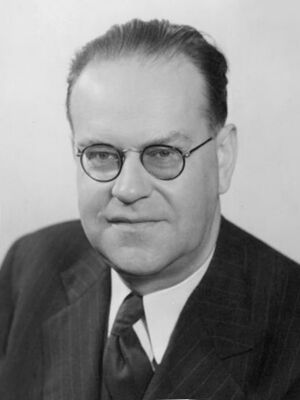Tage Erlander
(politician) | |
|---|---|
 | |
| Born | 1901-06-13 Ransäter, Värmland County, Sweden |
| Died | 1985-06-21 (Age 84) Huddinge, Stockholm County, Sweden |
| Nationality | Swedish |
| Alma mater | Lund University |
| Spouse | Aina Erlander |
| Party | Swedish Social Democratic Party |
Tage Fritjof Erlander was a Swedish politician who was Prime Minister of Sweden from 1946 to 1969. He was the leader of the Swedish Social Democratic Party and led the government for an uninterrupted tenure of 23 years, one of the longest in any democracy.
Becoming a member of the World War II coalition government in 1944, Erlander rose unexpectedly to the leadership upon the death of Prime Minister Per Albin Hansson in October 1946, maintaining the position of the Social Democrats as the dominant party in the country. Known for his moderation, pragmatism and self-irony, Erlander often sought approval from the liberal-conservative opposition for his policies, de facto dropping all pretences of wide-scale nationalizations whilst introducing reforms such as universal health insurance, pension additions and a growing public sector, although stopping short of raising tax levels above the average OECD levels at the time. Until the 1960s, income taxes were lower in Sweden than in the United States.[1]
For most of his time in power, Erlander ran a minority government of the Social Democrats. From 1951 to 1957, he instead ran a coalition with the Farmers' League.[2][3] The Social Democrats held a majority of seats in the upper house for most of this time and this allowed Erlander to remain in power after the 1956 general election, when the right-wing parties won a majority. A snap election in 1958 then reversed this result.
In foreign policy, he initially sought an alliance of Nordic countries, but without success, instead maintaining formal strict neutrality while keeping a secret de facto collabration with NATO.
In this period, Sweden built up among the most impressive armed forces and armaments industry in the world (surpassed only by the United States, the Soviet Union and Israel in terms of per-capita spending), making the Swedish Air Force the third largest in the world, while ultimately rejecting nuclear capability, signing the nuclear non-proliferation treaty in 1968.
Erlander's mandate coincided with the post–World War II economic expansion, in Sweden known as the record years, in which Sweden saw its economy grow to one of the ten strongest in the world, and subsequently joined the G10.
In the 1968 general election, he won his seventh and most successful victory, with the Social Democrats winning an absolute majority of the popular vote and seats in the lower chamber. Erlander resigned the following year during a process of major constitutional reform, and was succeeded by his long-time protégé and friend Olof Palme.
Event Participated in
| Event | Start | End | Location(s) | Description |
|---|---|---|---|---|
| Bilderberg/1962 | 18 May 1962 | 20 May 1962 | Sweden Saltsjöbaden | The 11th Bilderberg meeting and the first one in Sweden. |
References
Wikipedia is not affiliated with Wikispooks. Original page source here